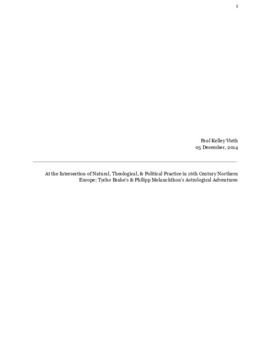| dc.description.abstract | Perhaps never has someone written so commendable a compliment which could, with as much accuracy, describe him- or herself as Tycho has done here. There is a popular misconception afoot concerning science, namely, that it and theology are fundamentally mutually-exclusive modes of thought and have almost inevitably antagonistic truth-procedures to the point that science is seen as waging a war against religious belief. This misconception, though perhaps more comprehensible in this day and age, is never more obviously false than when the early modern period, through the telescope of history, if you will, is under examination. Throughout the narrative of sixteenth-century astronomy, Tycho Brahe’s personal and professional opinions, as well as those of his political and academic peers, run contrary to these modern misconceptions. As will be seen herein, the codependent enmeshing of religion and politics holds as truly for natural inquiry and religion. Rather than being combative alternative routes to higher truth, theology and natural philosophy in this period, rather, for some early modern scholars and theologians, operate in conjunction with one another. Not only do the theological and scientific cohabitate in the minds of sixteenth-century scholars, they cooperate to such an extent that any acuteness of understanding in natural philosophy is consequently and necessarily an exercise in scrutinizing the divine. This is neatly, though not uniquely, evident in Tycho Brahe’s program of astronomical empiricism, its prognostic applications, and Philip Melanchthon’s encouragement of and the Danish court’s patronage of such an endeavor. | en_US |
